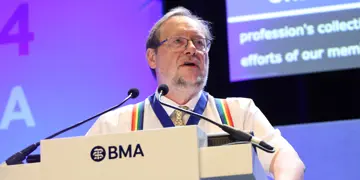Demand for Government to answer for ‘vague promises’
Demand for Government to answer for ‘vague promises’
BMA ARM address hears of council chair’s frustration with effects of cuts in spending on doctors’ welfare
The prime minister must answer for the ‘empty promises’ which have resulted in junior doctors in England calling another strike for later this week, despite calling an election which might result in a change of government.
That was the message from BMA council chair Phil Banfield (pictured above) opening the association’s 2024 annual representative meeting today – in a speech in which he also announced legal action against the GMC in a bid to stop the ‘dangerous blurring of the lines’ between highly skilled and trained doctors and the medical associate professions.
Professor Banfield spoke of the terrible effect on doctors of the Government’s cuts in spending and investment, doctors’ fears of speaking out about patient-safety issues and how the use of physician associates – who are not qualified doctors – are putting the profession and patient care at risk.
Professor Banfield told the conference: ‘It will be deeds, not words, that will guide our relationship with any new Government and there is a need to reset the way doctors across the UK are treated by Government and employers.’
While industrial action and months of difficult negotiations resulted in the BMA securing pay uplifts for consultants and specialist, associate specialist and specialty doctors in England, Professor Banfield told the conference of his frustration that the Westminster Government has strung junior doctors along for 20 months with no intention of finding a resolution.
He said: ‘We have proved that we can resolve disputes through negotiation. Even the Conservatives can do it when they try. They had their chance and blew it with our lowest-paid doctors. But I have a message for Rishi Sunak. Calling an election does not get you off the hook. When junior doctors take industrial action once more this week, you must answer for your vague and empty promises that have resulted in endless procrastination and talks without a purpose.’
Frightened to speak out
Professor Banfield spoke of his frustration about lengthy disputes on pay, poor investment in doctors, and the financial and workforce crisis facing general practice with record demand on GPs. He also used his speech to reveal the findings of a survey undertaken by the BMA to examine doctors’ attitudes to raising concerns about patient safety. The BMA surveyed doctors about whistleblowing in 2018 and again a few months ago. The findings revealed that doctors are now more frightened than ever to speak up when they see patient safety issues, or levels of care at risk. They told the BMA their reluctance relates to the fear that they or their colleagues will be punished, and careers ended if they speak up.
He said: ‘I said last year that the BMA will not stand idly by as employers try to silence those who raise concerns, and it has not. Have we learned from Letby? Let me tell you – I fear not. Pandora’s box is about to be thrown wide open. This is far bigger than the Post Office scandal and the BMA will do all it can to help uncover wrongdoing. You have come forward to your union because you are so fearful of your employers. We will create the safe space you have been denied. We owe it to you, and we owe it to our patients.’
In the speech, Professor Banfield announced the BMA has launched legal action against the GMC in a bid to stop the ‘dangerous blurring of the lines’ between highly skilled and trained doctors and the medical associate professions and that the association would not stand for the Government and NHS leadership ‘eroding’ the profession.
It comes in the wake of recent legislation which will see the GMC becoming the regulator of physician associates and anaesthesia associates from December 2024.
The BMA has argued that physician and anaesthesia associates – who complete a two-year course rather than a five-year medical degree – need regulating, but that the GMC is not the right organisation to do this.
The GMC has been using the term ‘medical professionals’ in its materials to describe all of its future registrants – both doctors and associates. This includes in Good Medical Practice, the key GMC guidance document for doctors, defining the standards of care and behaviour that are expected, which is used as a reference to determine fitness to practise.
The BMA is now launching a judicial review claim against the GMC over its use of this term, which the association says should only ever be used to refer to qualified doctors.
The gathering in Belfast is the BMA’s annual conference where future policy is set. It is attended by doctors from across the UK.
Doctors have been asked by the BMA to sign an open letter to party leaders, expressing grave concerns about the risks posed by MAPs, as currently deployed in the NHS.
Its calls include the implementation of a national safe scope of practice for MAPs underpinned by robust evidence and regulation, an end to widespread doctor unemployment and replacement, and a halt to any plans to provide MAPs with prescribing responsibilities.
- Until September 2024, resident doctors were referred to as ‘junior doctors’ by the BMA. Articles written prior to this date reflect the terminology then in use



